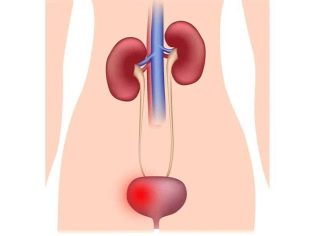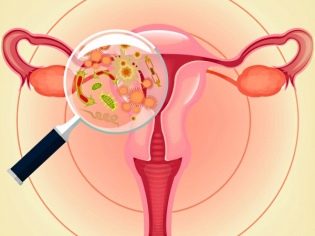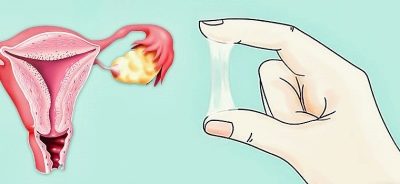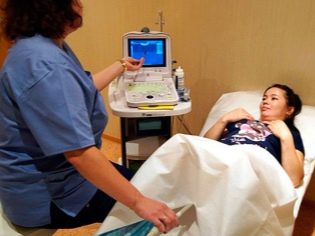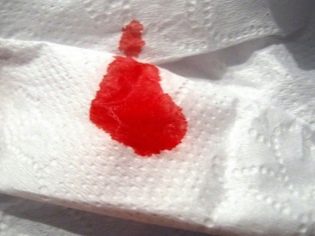Beige discharge in early pregnancy
Discharge from the genital tract is quite a physiological phenomenon for any woman. However, if at the same time they acquire a color that is uncharacteristic for a normal state, a sharp odor, or become intense, then this indicates some kind of pathology requiring therapy. If such phenomena occur during pregnancy, then such changes require even more attention from the expectant mother and her doctor. This article will focus on beige vaginal discharge during pregnancy. What problems this symptom may indicate and whether there is a threat to the fetus in this situation - these are the questions that many expectant mothers are interested in.
Beige discharge as a symptom of an infectious process
The most common beige discharge during early pregnancy is due to the presence of an inflammatory process in the genital and urinary systems, which has a latent form of leakage. Basically, these processes are provoked by the arising activity of conditionally pathogenic microflora, which has manifested itself against the background of decreased immunity for first weeks of pregnancy. It is better to completely cure such diseases at the planning stage of conception than after its onset.
Often, a similar situation can occur when a woman becomes pregnant and her immune protection weakens, and already because of this, latent infections have begun to manifest themselves.
In this case, treat the pathology, a symptom of which will be cream discharge, perhaps only by those therapeutic methods that do not have a toxic effect on the developing fetus.
Beige discharge during pregnancy does not always indicate a pathology requiring medical intervention, because quite often they have a completely safe origin. To determine how dangerous such manifestations, you need to be vigilant. First, it is necessary to closely monitor all their subjective feelings. Secondly, if the scanty vaginal discharge suddenly became much more intense, changed color or became smelly, then this is a serious reason to immediately consult a doctor.
Sometimes a pregnant woman may note that in the light beige daub there are blood impurities, as at the onset of menses. Most likely, this symptom indicates a successful implantation of the ovum. Of course, this applies only to the first weeks of pregnancy, but if it lasts a long time, and the intensity of bleeding increases and they begin to smell unpleasant, then you need to conduct a survey and according to its results prescribe treatment.
In most cases, creamy discharge occurs as a result of inflammatory pathologies of the cervix, which can be diagnosed using a gynecological smear. During pregnancy, the woman's body experiences biochemical loads that are uncharacteristic to the normal state.
Now all resources are directed to the prenatal development of the fetus and the provision of all its needs, therefore, sometimes there is nothing left to satisfy the body’s own needs. First of all, it concerns the reduction of immunity activity, because of which the pregnant woman's body cannot fully resist the attack of various infectious agents.Therefore, chronic diseases are often exacerbated during this period and latent infections manifest themselves, which can lead to spontaneous abortion or the development of structural abnormalities in the fetus.
The most dangerous infections for pregnant women
If a woman in the early weeks of gestation appeared uncharacteristic and fetid beige vaginal discharge, then she should inform the doctor, as this symptom may indicate the presence of infectious diseases. Ignoring the problem is definitely not worth it - it can indicate the occurrence of one of a number of serious diseases.
- Vaginal dysbacteriosis. This pathology is characterized by the appearance of thick and dark vaginal discharge, which appear as a result of changes in the local flora.
- Cervicitis (inflammation of the cervical canal). The color of the discharge in this case will depend on the type of infectious pathogen.
- Inflammation of the fallopian tubes. This pathology can also manifest itself in the form of an unusual daub. In this situation, the discharge in the second trimester and in the first weeks of gestation may be beige, red, or yellow. In addition, pain in the lower abdomen may join with this symptom.
- Sexually transmitted infections (trichomoniasis, chlamydia, gonorrhea, etc.). Vaginal secretions of a beige color are also characteristic of this group of diseases, however, in the mucus there will be fetid impurities of pus, as well as symptoms of fever (general malaise, fever, headache, aching joints, etc.).
Independently identify the true cause of vaginal discharge is not possible. This can be done exclusively with the help of a number of laboratory studies.
Other causes of beige discharge during pregnancy
From the moment of successful implantation of the ovum into the endometrium, the hormonal background of the female body begins to change. Such changes affect the nature of secretions from the genital tract - they become more viscous and opaque. However, they should not have a pronounced color, unpleasant smell and be accompanied by other symptoms. (itching or burning in the genital area, discomfort when urinating, pain in the abdomen, fever, etc.).
If there are no extraneous symptoms, this phenomenon can be considered a physiological norm in the first trimester, and this is explained by an increase in the concentration of the hormone progesterone: thanks to it, the cervical mucus becomes unusually viscous, resulting in the so-called mucus plug, which protects the fetus from all kinds of external environment.
Already in the second trimester, the concentration of estrogen in a woman’s body increases, as a result of which the vaginal secretions acquire a more liquid structure.
Small beige-brown vaginal discharge may occur as a result of sexual intercourse or intravaginal (intravaginal) ultrasound. This is because the mucous layer of the uterus during pregnancy acquires a loose structure, because of which it becomes more vulnerable to various kinds of mechanical action.
Also, beige-brown vaginal discharge can indicate serious pathologies, such as ectopic pregnancy, peeling of the ovum, or cervical erosion. Ectopic pregnancy is accompanied by acute pain in the lower abdomen, and the discharge acquires a scarlet hue and turns into bleeding. At the time of rupture of the fallopian tube, a woman’s blood pressure drops sharply and symptoms of "acute abdomen" appear.
This condition is considered life threatening and requires emergency care.
What should a pregnant woman do if there are beige highlights?
To begin with about all the changes occurring in the body of a pregnant woman, you must inform the doctor. The specialist will conduct an examination and prescribe all necessary examinations on the basis of which it will be possible to consider the question of the appropriateness of drug therapy. If the discharge becomes creamy, changes color, is accompanied by other associated symptoms, the doctor may be asked about treatment in the hospital.
As a preventive measure, obstetricians and gynecologists recommend, first of all, to undergo all necessary examinations in a timely manner. In addition, the expectant mother must follow the basic principles of nutrition, avoid stress, adhere to the optimal regime of physical activity and rest. As a preventive measure, a pregnant woman can also wear cotton underwear, which will significantly reduce the risk of candidiasis and other inflammatory processes in the vaginal mucosa.
In order to more effectively control changes in the nature of the discharge, it is recommended to use sanitary pads for daily use. However, tampons cannot be used for this purpose, as they contribute to the development of infection in the genital tract.
Total
The physiological norm during pregnancy is considered to be one-time beige or brown vaginal discharge, which most likely indicates completion of the implantation of the ovum into the endometrium of the uterus. If such secretions appear regularly, acquire an unpleasant odor, turn into hemophysis, and are also accompanied by other associated symptoms, you should immediately notify the doctor.
About what selection should alert the woman, see the following video.


